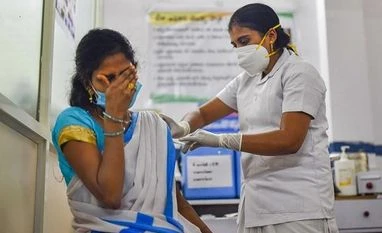With more than 630,000 vaccinated within the first four days of the drive in India — the fastest in the world in doing so — the government strongly urged health care workers to shed hesitancy and come forward to take the jab in order to create a Covid-proof health care system and achieve vaccine-induced herd immunity.
“The whole world is clamouring for a vaccine. If we still decline, it would be a matter of sadness... I will urge them (health care workers) to endorse the vaccine. We have to start non-Covid services; those who are fortunate to receive the vaccine should not refuse it,” said V K Paul, member (health), NITI Aayog.
Paul, who has himself taken a shot of Bharat Biotech's Covaxin, had assured people of safety. He said India has finally got a breather from Covid, and that this is the time to vaccinate as many as possible.
So far, says the health ministry, ‘adverse events following immunisation’ (AEFI) make up 0.18 per cent of the total vaccinations, and only 0.002 per cent cases have ended in hospitalisation.
“Concerns about adverse events following immunisation are unfounded and insignificant. We are in a situation of a lot of comfort. These two vaccines are safe. There is no undue reactogenicity,” said Rajesh Bhushan, health secretary.
According to provisional numbers, a total of 177,368 beneficiaries were vaccinated on Tuesday, across 3,800 sessions. A total of nine cases of AEFI required hospitalisation, a health ministry statement said.
The government is urging states with less than 40 per cent of the targeted coverage to take steps to ramp up the number of sessions, such as Punjab, Puducherry, and Tamil Nadu.
Goa, HP, and UP hold vaccination sessions only two days a week.
The health ministry is advising them to increase the frequency of vaccinations. “We have just started and will pick up speed,” Bhushan added.
The health ministry has also clarified that the decision on whether to provide Covishield or Covaxin to states was taken up on the basis of the total supply available. However, the final decision on which of the vaccines would go to which session, was left entirely on states. “Micromanagement in such matters can be done better by the states,” said Bhushan.
Bhushan added that the follow-up on adverse events after vaccination was a passive exercise in case a person was being given Covishield, and that the onus of reporting such events lies on the beneficiary. In the case of Covaxin, however, a proactive follow-up is done by doctors since approval has been granted only for restricted use in clinical trials.
He added that in case of any adverse event caused by Covaxin, the cost of hospitalisation would be borne by the authorities. Assuring that a robust mechanism has been put in place for reporting and monitoring adverse events, Bhushan said side effects such as anxiety and hysteria were also being recorded. “One can even have a crying bout. However, it subsides after a few minutes.”
A global comparison.
Vaccination roll-out: Day One
France: 73
UK: 19,700,
US: 79,458
India: 2,07,229
First week vaccination
US: 5,56,208
UK 1,27,897
France: 516
Russia: 52,000.
Unlock 30+ premium stories daily hand-picked by our editors, across devices on browser and app.
Pick your 5 favourite companies, get a daily email with all news updates on them.
Full access to our intuitive epaper - clip, save, share articles from any device; newspaper archives from 2006.
Preferential invites to Business Standard events.
Curated newsletters on markets, personal finance, policy & politics, start-ups, technology, and more.




)